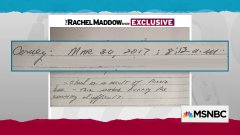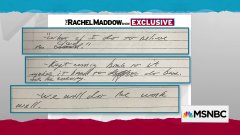The following article by Matt Zapotosky was posted on the Washington Post website April 10, 2018:

Dana Boente, the former acting attorney general who now serves as general counsel at the FBI, has been interviewed by the special counsel’s office and turned over handwritten notes that could be evidence in the ongoing investigation into whether President Trump obstructed justice, according to people familiar with the matter.
Boente was interviewed months ago by special counsel Robert S. Mueller III’s team on a wide range of topics, including his recollections of what former FBI director James B. Comey told him about troubling interactions with Trump, one of the people said.
The interview is significant, because it shows how Mueller is exploring whether the president obstructed justice and keying in on conversations Trump had with his former FBI director about the probe involving his presidential campaign. It also shows the extent to which Mueller has gone to corroborate Comey’s account.
The FBI and special counsel’s office declined to comment for this article.
Trump has accused Comey of lying about their conversations, although Comey has said he kept contemporaneous memos documenting the interactions.
Boente — who stepped in to defend Trump’s entry ban when acting attorney general Sally Yates refused to do so, earning a personal thank you from Trump — might be viewed as a witness more friendly to the president. He was appointed as U.S. attorney in the Eastern District of Virginia during the Obama administration, but he went on to serve in a variety of high-ranking, acting roles under Trump, including acting attorney general, acting deputy attorney general and head of the Justice Department’s National Security Division.
Boente, though, is not an eyewitness to Trump and Comey’s interaction. He can only corroborate that what Comey told him lines up with what the former FBI director wrote in his memos and later told Congress.
Comey has said publicly that he relayed to Boente a March 30, 2017, conversation in which Trump complained to him that the “cloud” of the investigation into whether his campaign coordinated with Russia was interfering with his ability to govern, and that he hoped they could publicize the fact that he was not personally under investigation.
At that time, Mueller had yet to be appointed, though the FBI was investigating the matter. Boente was then the acting deputy attorney general and was overseeing the investigation because Attorney General Jeff Sessions had recused himself. In that role, he signed a controversial, secret court application to surveil a former Trump campaign adviser.
Comey has also said publicly that Trump, in an earlier conversation, asked him to let go the FBI’s investigation into former national security adviser Michael Flynn, though he said he did not immediately relay that request to Justice Department leadership. At the time, Sessions had not yet recused himself.
The people familiar with the matter said Boente also gave to Mueller notes he had made about his own conversation with Comey. The notes, which were first shown on MSNBC’s Rachel Maddow Show and confirmed as authentic to The Washington Post by a person familiar with the matter, seem to confirm that what Comey told Boente in the spring of 2017 was consistent with what Comey would later tell Congress about his interactions with Trump.
Comey has said that in April 2017 Trump again asked him about publicizing the fact that he was not personally under investigation, and he told the president that he had passed on his request to Boente. He said Trump asked whether his people should also reach out, and he responded that the White House counsel’s office should make the request. White House counsel Donald McGahn later did so but failed to convince Boente that the department should issue a public statement.


